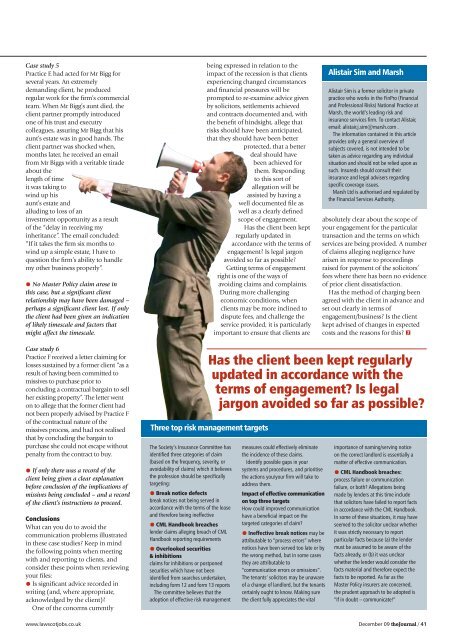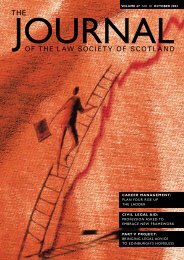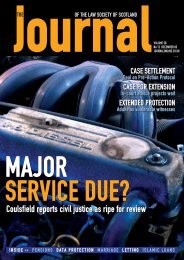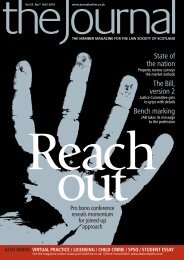Professional briefing - The Journal Online
Professional briefing - The Journal Online
Professional briefing - The Journal Online
You also want an ePaper? Increase the reach of your titles
YUMPU automatically turns print PDFs into web optimized ePapers that Google loves.
Case study 5<br />
Practice E had acted for Mr Bigg for<br />
several years. An extremely<br />
demanding client, he produced<br />
regular work for the firm’s commercial<br />
team. When Mr Bigg’s aunt died, the<br />
client partner promptly introduced<br />
one of his trust and executry<br />
colleagues, assuring Mr Bigg that his<br />
aunt’s estate was in good hands. <strong>The</strong><br />
client partner was shocked when,<br />
months later, he received an email<br />
from Mr Biggs with a veritable tirade<br />
about the<br />
length of time<br />
it was taking to<br />
wind up his<br />
aunt’s estate and<br />
alluding to loss of an<br />
investment opportunity as a result<br />
of the “delay in receiving my<br />
inheritance”. <strong>The</strong> email concluded:<br />
“If it takes the firm six months to<br />
wind up a simple estate, I have to<br />
question the firm’s ability to handle<br />
my other business properly”.<br />
No Master Policy claim arose in<br />
this case, but a significant client<br />
relationship may have been damaged –<br />
perhaps a significant client lost. If only<br />
the client had been given an indication<br />
of likely timescale and factors that<br />
might affect the timescale.<br />
Case study 6<br />
Practice F received a letter claiming for<br />
losses sustained by a former client “as a<br />
result of having been committed to<br />
missives to purchase prior to<br />
concluding a contractual bargain to sell<br />
her existing property”. <strong>The</strong> letter went<br />
on to allege that the former client had<br />
not been properly advised by Practice F<br />
of the contractual nature of the<br />
missives process, and had not realised<br />
that by concluding the bargain to<br />
purchase she could not escape without<br />
penalty from the contract to buy.<br />
If only there was a record of the<br />
client being given a clear explanation<br />
before conclusion of the implications of<br />
missives being concluded – and a record<br />
of the client’s instructions to proceed.<br />
Conclusions<br />
What can you do to avoid the<br />
communication problems illustrated<br />
in these case studies? Keep in mind<br />
the following points when meeting<br />
with and reporting to clients, and<br />
consider these points when reviewing<br />
your files:<br />
Is significant advice recorded in<br />
writing (and, where appropriate,<br />
acknowledged by the client)?<br />
One of the concerns currently<br />
www.lawscotjobs.co.uk<br />
<strong>The</strong> Society’s Insurance Committee has<br />
identified three categories of claim<br />
(based on the frequency, severity, or<br />
avoidability of claims) which it believes<br />
the profession should be specifically<br />
targeting:<br />
Break notice defects<br />
break notices not being served in<br />
accordance with the terms of the lease<br />
and therefore being ineffective<br />
CML Handbook breaches<br />
lender claims alleging breach of CML<br />
Handbook reporting requirements<br />
Overlooked securities<br />
& inhibitions<br />
claims for inhibitions or postponed<br />
securities which have not been<br />
identified from searches undertaken,<br />
including form 12 and form 13 reports<br />
<strong>The</strong> committee believes that the<br />
adoption of effective risk management<br />
being expressed in relation to the<br />
impact of the recession is that clients<br />
experiencing changed circumstances<br />
and financial pressures will be<br />
prompted to re-examine advice given<br />
by solicitors, settlements achieved<br />
and contracts documented and, with<br />
the benefit of hindsight, allege that<br />
risks should have been anticipated,<br />
that they should have been better<br />
protected, that a better<br />
deal should have<br />
been achieved for<br />
them. Responding<br />
to this sort of<br />
allegation will be<br />
assisted by having a<br />
well documented file as<br />
well as a clearly defined<br />
scope of engagement.<br />
Has the client been kept<br />
regularly updated in<br />
accordance with the terms of<br />
engagement? Is legal jargon<br />
avoided so far as possible?<br />
Getting terms of engagement<br />
right is one of the ways of<br />
avoiding claims and complaints.<br />
During more challenging<br />
economic conditions, when<br />
clients may be more inclined to<br />
dispute fees, and challenge the<br />
service provided, it is particularly<br />
important to ensure that clients are<br />
Alistair Sim and Marsh<br />
Alistair Sim is a former solicitor in private<br />
practice who works in the FinPro (Financial<br />
and <strong>Professional</strong> Risks) National Practice at<br />
Marsh, the world’s leading risk and<br />
insurance services firm. To contact Alistair,<br />
email: alistair.j.sim@marsh.com .<br />
<strong>The</strong> information contained in this article<br />
provides only a general overview of<br />
subjects covered, is not intended to be<br />
taken as advice regarding any individual<br />
situation and should not be relied upon as<br />
such. Insureds should consult their<br />
insurance and legal advisers regarding<br />
specific coverage issues.<br />
Marsh Ltd is authorised and regulated by<br />
the Financial Services Authority.<br />
absolutely clear about the scope of<br />
your engagement for the particular<br />
transaction and the terms on which<br />
services are being provided. A number<br />
of claims alleging negligence have<br />
arisen in response to proceedings<br />
raised for payment of the solicitors’<br />
fees where there has been no evidence<br />
of prior client dissatisfaction.<br />
Has the method of charging been<br />
agreed with the client in advance and<br />
set out clearly in terms of<br />
engagement/business? Is the client<br />
kept advised of changes in expected<br />
costs and the reasons for this?<br />
Has the client been kept regularly<br />
updated in accordance with the<br />
terms of engagement? Is legal<br />
jargon avoided so far as possible?<br />
Three top risk management targets<br />
measures could effectively eliminate<br />
the incidence of these claims.<br />
Identify possible gaps in your<br />
systems and procedures, and prioritise<br />
the actions you/your firm will take to<br />
address them.<br />
Impact of effective communication<br />
on top three targets<br />
How could improved communication<br />
have a beneficial impact on the<br />
targeted categories of claim?<br />
Ineffective break notices may be<br />
attributable to “process errors” where<br />
notices have been served too late or by<br />
the wrong method, but in some cases<br />
they are attributable to<br />
“communication errors or omissions”.<br />
<strong>The</strong> tenants’ solicitors may be unaware<br />
of a change of landlord, but the tenants<br />
certainly ought to know. Making sure<br />
the client fully appreciates the vital<br />
importance of naming/serving notice<br />
on the correct landlord is essentially a<br />
matter of effective communication.<br />
CML Handbook breaches:<br />
process failure or communication<br />
failure, or both? Allegations being<br />
made by lenders at this time include<br />
that solicitors have failed to report facts<br />
in accordance with the CML Handbook.<br />
In some of these situations, it may have<br />
seemed to the solicitor unclear whether<br />
it was strictly necessary to report<br />
particular facts because (a) the lender<br />
must be assumed to be aware of the<br />
facts already, or (b) it was unclear<br />
whether the lender would consider the<br />
facts material and therefore expect the<br />
facts to be reported. As far as the<br />
Master Policy insurers are concerned,<br />
the prudent approach to be adopted is<br />
“If in doubt – communicate!”<br />
December 09 the<strong>Journal</strong> / 41










